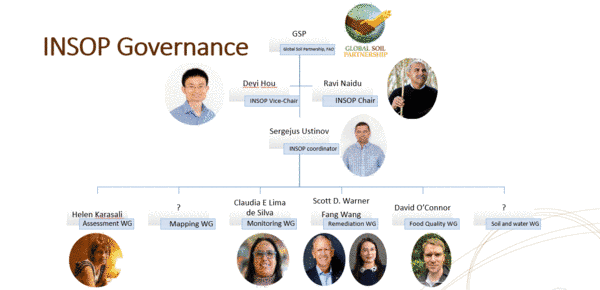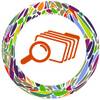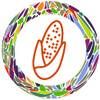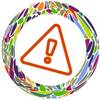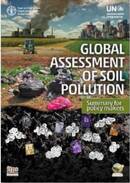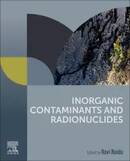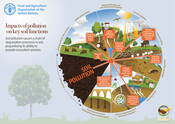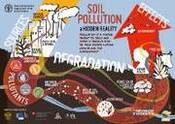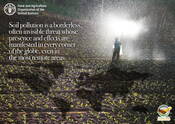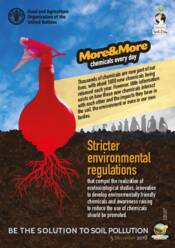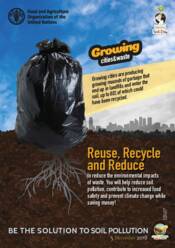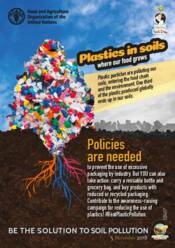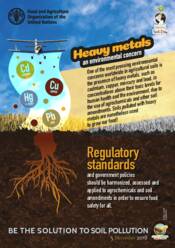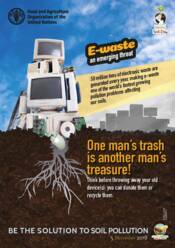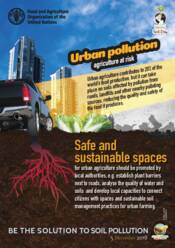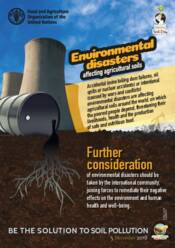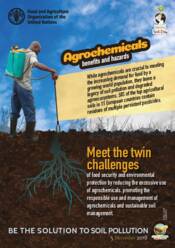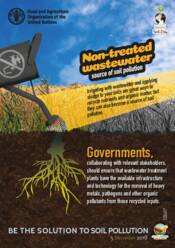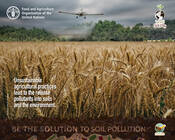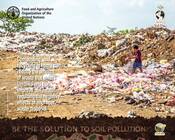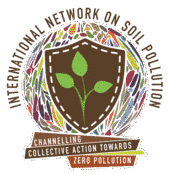
International Network on Soil Pollution
The International Network on Soil Pollution (INSOP) has the overall aim of stopping soil pollution and achieving the global goal of zero pollution. To this end, INSOP works to improve knowledge on the full cycle of soil pollution, from assessment to remediation, as well as on the effect on environmental and human health and the provision of soil ecosystem functions and services. INSOP also aims to strengthen technical capacities and legislative frameworks for the prevention of soil pollution and promotes the exchange of experiences and technologies for the sustainable management and remediation of polluted soils. For more information contact: [email protected] and the: GSP-Secretariat.
How to get involved
INSOP welcomes members from around the world who share the vision of a world with Zero Pollution and healthy soils. INSOP's membership is free of charge and its success is based on the active and voluntary participation of each of its members. Please sign in to join the network.
Join this Network
INSOP functions and duties
Pollution is one of the biggest environmental problems globally posing a significant risk to the environment and human health (FAO 2015). Actions at the local level can have effects beyond national borders. Joint and coordinated actions are therefore required to prevent soil pollution and to control, manage and remediate polluted soils. Many stakeholders around the world are working on different aspects to prevent, control and remediate soil pollution, but there is a lack of effective global coordination between governments, policymakers, land users, academia, and society.
The creation of this Network is an urgent response to scale-up global efforts and will allow for an effective, coordinated and inclusive communication of all stakeholders to implement the global action agenda on soil pollution and move towards a world with Zero Pollution.
INSOP’s mission is to support and facilitate joint efforts towards reducing the risks of soil pollution and effectively remediate already polluted areas.
INSOP serves the global community by:
• Providing an international forum for the generation and dissemination of knowledge on soil pollution;
• Promoting and exchanging good practices, practical and scientific knowledge and innovative solutions for managing polluted soils in a sustainable manner;
• Establishing interdisciplinary cooperative links between governments, academia, the private sector, and society to stimulate the development of cleaner and more sustainable solutions and consumption options; and
• Strengthening technical and technological capacities through coordination among existing networks.
The INSOP operates under six working groups (WGs), each tasked with specific activities. Join our network WGs to achieve the following goals:
1. Assessment of soil pollution
• Advocate for the development of global harmonized methods, including standard operating procedures (SOPs) to identify and measure soil pollutants; and
• Advocate for creating a global database on soil pollutant threshold values in agricultural soils and other land uses, focusing on heavy metals and pesticides.
2. Mapping soil pollution
• The generation of spatial datasets on the distribution of polluted soils and potential sources of pollution is of utmost importance in informed decision-making.
3. Monitoring and regulation of polluted soils .
• The generation of spatial datasets on the distribution of polluted soils and potential sources of pollution is of utmost importance in informed decision-making.
4. Sustainable management and remediation of polluted soils
• Advocate for the development of national capacities and strengthen technology transfer for remediation and sustainable management of polluted soils.
5. Agricultural practice and food quality.
• Advocate for the promotion of soil pollution to be included in the One Health approach and the Global Health Observatory; and
• Support the inclusion of soil pollution risk assessment and minimization measures in the Global Soil Doctors Programme in supporting land users to avoid soil pollution.
6. Soil and water
• Strengthen knowledge of the environmental and associated ecotoxicological risks, environmental fate and behaviour of soil and water pollutants. The activities of the working group are yet to be endorsed in 2024.
To register your interest, please submit the following FORM .
By joining INSOP you will contribute to addressing knowledge gaps on soil pollution at all levels.
You will participate in the process of building reliable soil data and information systems and in decision-making for the development of internationally accepted methodologies and indicators. As a member of INSOP you will also be able to share your management and remediation practices and techniques, improve and extend the use of innovative technologies and participate in the joint design of nature-based solutions and other sustainable options.
As part of the INSOP, you can strengthen engagement and visibility, link to policy and policymakers, and open opportunities for future collaborations with other members. You will be part of an extensive network of experts and other networks created within the framework of the United Nations, thus offering a unique opportunity to engage with governments, academia, the private sector, and civil society.
INSOP welcomes representatives from governments, academia, the private sector, NGOs, and any other stakeholders from around the world who share the vision of a world with Zero Pollution and healthy soils. Please complete this form to join the Network Once your registration has been processed, your organization will be included on the INSOP’s interactive map (see below). INSOP's membership is free of charge and its success is based on the active and voluntary participation of each and every one of its members.
- WG 1: ASSESSMENT
- WG 2: MAPPING
- WG 3: MONITORING AND REGULATORY
- WG 4: SUSTAINABILITY AND REMEDIATION
- WG 5: AGRICULTURAL PRACTICE AND FOOD QUALITY
- WG 6: SOIL AND WATER POLLUTION
PRIORITIES OF THE ASSESSMENT WORKING GROUP ON SOIL POLLUTION | OCTOBER 2023 VERSION
|
|
| |
PRIORITY 1 | Advocate for the development of global harmonized methods, including standard operating procedures (SOPs) to identify and measure soil pollutants |
| |
OUTCOME | Soil laboratories are well-informed about the harmonized SOPs for soil pollutants and their usage |
| |
KEY PERFORMANCE INDICATORS | LONG TERM By 2025, 80 percent of soil laboratories working with the GSP will be aware of how to use the harmonized SOPs for measuring soil pollutants in the laboratory | SHORT TO MEDIUM TERM At least one soil laboratory working with the GSP from each region is involved in the development of harmonized SOP | |
KEY ACTIVITIES |
|
| |
PRIORITY 2 | Advocate for creating a global database on soil pollutant threshold values in agricultural soils and other land uses focusing on heavy metals and pesticides |
| |
OUTCOME | (1) Foster a deeper understanding of existing soil pollutant threshold values worldwide; and (2) Countries making informed decisions based on the data and information of soil pollutant threshold values |
| |
KEY PERFORMANCE INDICATORS | LONG TERM Number of countries are working towards the adoption of threshold values for soil contaminants within national regulation | SHORT TO MEDIUM TERM At least 50 percent of the countries are involved in the discussions on the establishment of threshold values for soil pollutants. | |
KEY ACTIVITIES |
|
| |
| WORKING GROUP 2: MAPPINGThe generation of a spatial datasets on the distribution of polluted soils and potential sources of pollution is of utmost importance in informed decision making. This area of work is carried out in close consultation with the International Network of Soil Information Institution (INSII). |
SCOPE | The overall objective of the 'Working Group (WG) 2: Mapping' is the identification of potential sources of pollution. This is of utmost importance in informed decision-making, so that pollution "hot spots" or areas of special concern due to the risk to human health and the environment can be easily identified. The overall goal is the generation of a spatial datasets on the distribution of polluted soils and potential sources of pollution. Collaboration with the INSII and its members will focus on a better understanding of the coexistence of contaminants and facilitate the management of sites with mixed contamination. Read more |
DATE OF THE MEETING | to be confirmed |
ACTIVITIES | Content available soon |
JOIN INSOP NOW |
PRIORITIES OF THE MONITORING WORKING GROUP (WG) ON SOIL POLLUTION | OCTOBER 2023 VERSION
|
|
| |
PRIORITY 1 | Advocate for a better understanding of national legal instruments on the prevention, monitoring and/or remediation of soil pollution |
| |
OUTCOME | A global INSOP database is developed and utilized by the countries to learn about the existing legal instruments of soil pollution prevention, monitoring and/or remediation |
| |
KEY PERFORMANCE INDICATORS | LONG TERM Proposal of an international instrument that positions soil pollution as a major global challenge and monitors its impacts | SHORT TO MEDIUM TERM Number of countries advocating for the development of soil pollution legal instrument | |
KEY ACTIVITIES |
|
| |
| |||
PRIORITIES OF THE REMEDIATION WORKING GROUP ON SOIL POLLUTION | OCTOBER 2023 VERSION
|
| |
PRIORITY 1 | Advocate for the development of national capacities and strengthen technology transfer for remediation and sustainable management of polluted soils | |
OUTCOME | (1) INSOP remediation database is widely recognized; and (2) Sustainable practices are disseminated among countries for remediating polluted soil, maximizing environmental, social, and economic benefits | |
KEY PERFORMANCE INDICATORS | LONG TERM An international database of sustainable soil pollution remediation practices is available for global use | SHORT TO MEDIUM TERM At least 60 percent of countries are represented through case studies in the global database |
KEY ACTIVITIES |
| |
PRIORITIES OF THE FOOD QUALITY WORKING GROUP ON SOIL POLLUTION | OCTOBER 2023 VERSION
|
|
| |
PRIORITY 1 | Advocate for the promotion of soil pollution to be included in the One Health approach and the Global Health Observatory |
| |
OUTCOME | Increased dedication and global awareness in including soil pollution indicators in the Global Health Observatory |
| |
KEY PERFORMANCE INDICATORS | LONG TERM By 2027, new soil pollution indicators will be proposed to the Global Health Observatory | SHORT TO MEDIUM TERM At least 60 percent of INSOP members are involved in the analysis of soil indicators | |
KEY ACTIVITIES |
|
| |
PRIORITY 2 | Support the inclusion of soil pollution risk assessment and minimization measures in the Global Soil Doctors Programme in supporting land users to avoid soil pollution |
| |
OUTCOME | Farmers are aware of soil pollution risk to food produce and minimize the impact using the Global Soil Doctors Programme |
| |
KEY PERFORMANCE INDICATORS | LONG TERM By 2027, farmers’ communities in at least 6 developing countries will be utilizing the provided training and exercises to prevent soil pollution (depending on funding) | SHORT TO MEDIUM TERM By 2025, farmers’ communities in at least 3 developing countries will be utilizing the provided training and exercises to prevent soil pollution | |
KEY ACTIVITIES |
|
| |
| WORKING GROUP 6: SOIL AND WATERMost contaminants in aquatic ecosystems come from anthropogenic land-based sources. Therefore, soil management can have an enormous impact on water quality, including pollution. Contaminants of concern such as plastic pollution of which 80% entering the ocean has a land origin, eutrophication and other land-based contaminants reaching the fresh and marine environments will be discussed and knowledge gaps addressed. |
SCOPE | The overall objective of the 'Working Group (WG) 6: Soil and water' is to raise awareness on the effects different contaminants of terrestrial origin could have on marine and aquatic ecosystems. In collaboration with the assessment WG, the WG will create a knowledge exchange platform on the environmental and associated ecotoxicological risks on soil and water pollution. Read more |
DATE OF THE MEETING | to be confirmed |
ACTIVITIES | Content available soon |
JOIN INSOP NOW |
INSOP meetings
INSOP Sustainable Management Working Group Meeting on remediation of polluted soils
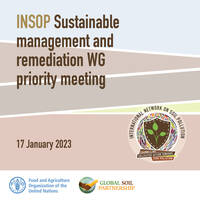
Virtual meeting | 17 january 2024 | READ MORE
INSOP Food Quality working group meeting on farmers' training and soil pollution indicators in the One Health approach
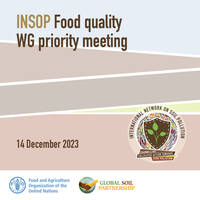
Virtual meeting | 14 December 2023 | READ MORE
INSOP Assessment WG meeting on SOP's for pesticides and soil pollutant threshold values
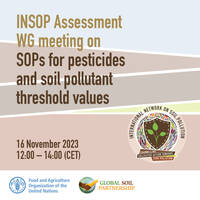
Virtual meeting | 16 November 2023 | READ MORE
International Network on Soil Pollution (INSOP) annual meetings
INSOP-INFA joint meeting on fertilizer quality assessment
INSOP meeting on national legal instruments for the prevention, monitoring and/or remediation of soil pollution

Virtual meeting | November 29 2023 | READ MORE
INSOP News

Read the latest INSOP bulletins:
Geographical distribution of INSOP members
Related activities
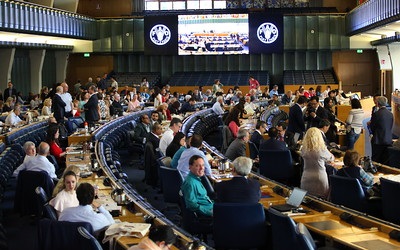
Global Symposium on Soil Pollution
2-4 May 2018, FAO headquarters
The Symposium was attended by more than 500 participants from 100 countries, including member states, academia, the private sector as well as scientists and land users working on soil pollution and related fields.
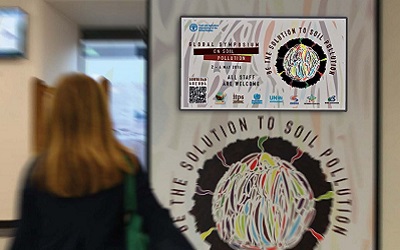
Plan of Action - GSOP18
Symposium Outcome document
The recommendations presented in the document support policies and actions that enhance the prevention, minimization and remediation of soil pollution through sustainable soil management.

Open International Forum-Webinar
8 Nov 2022, 13:00-16:00 CET
This webinar, organized on the grounds of the Russian Timiryazev State Agrarian University will open a discussion on environmental regulation of the quality of phosphate fertilizers.
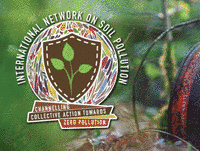
INSOP LAUNCH
TThe International Network on Soil Pollution (INSOP) was launched on 22 April 2022 at a virtual event, as part of FAO’s observance of International Mother Earth Day. Read more on the launch event.
Related publications
Communication material
Soil pollution - Be the solution to soil pollution: Campaign material (World Soil Day 2018 and Global Symposium on Soil Pollution)
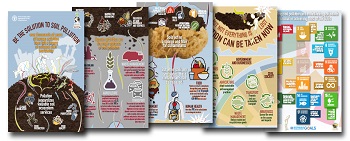
Be the solution to soil pollution
Over thousands of years of human activities have left a legacy of polluted soils worldwide.
Other languages: Italian
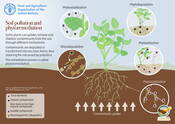
Soil pollution and phytoremediation
Some plants can uptake, remove and stabilize contaminants from the soil, through different mechanisms.
Impacts of soil pollution on key soil functions
Soil pollution causes a chain of degradation processes in soil, jeopardizing its ability to provide ecosystem services.
Pollution-induced changes in the functioning of soil ecosystems
Mobile soil fauna often uses an avoidance strategy, reducing the first steps of litter decomposition in heavily polluted soils.
Economic losses due to soil pollution
Soil pollution entails direct remediation and management costs ranging from thousands to billions of dollars per year, depending on the extent and type of contaminants.
Soil pollution jeopardizes the achievement of most of the SDGs
The prevention, control, and remediation of soil pollution are fundamental if we want to implement the 2030 Agenda for Sustainable Development.

Impact of soil contaminants on human health
Contaminants in soil have widespread effects on organs and systems, producing a wide variety of health outcomes, from acute to chronic diseases, leading to severe development issues, changes in bodily functions, and premature death.
Contaminants tranfer to the food chain
Contaminated plants and soil organisms lead to potentially hazardous accumulations in animals higher in the food web such as grazing animals, birds and ultimately transferred to humans.
Soil pollution, a hidden reality
This poster presents in a nutshell the sources, degradation processes and effects of soil pollution on the environment, human health and food safety and security.
Other languages: Thai
Soil pollution is borderless
Soil pollution is a borderless often invisible threat whose presence and effects are present in every corner of the globe.
Soil pollution postcards
Videos and animations
|
7 things you can do to stop soil pollution Let's be the solution to stop soil pollution! |
|
How can you be the solution to soil pollution? Even through your small actions you can contribute to a big goal, to #StopSoilPollution. Reduce, reuse and recycle can help you, your community by improving your health and the health of our soils. Short version: English |
|
Soil Pollution, a hidden reality Soil is a complex growing habitat that remains productive only when it is cared for and nurtured. Combating and addressing soil pollution means assessing and minimizing the risks for food security, human health and the environment. |

